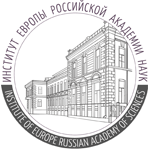institute of europe
the institute of europe of the russian academy of sciences
Round Table “What Difference Will Brexit Make To Britain And The EU?”
- 10 October 2019
On October 10, 2019, Russian International Affairs Council (RIAC) held the round table “What Difference Will Brexit Make To Britain And The EU?” with Ian Bond, Director of the Foreign Policy Department of the London Center for European Reform. Elena Ananieva, Head of the Center for UK Studies of the Institute of Europe, RAS, was moderator of the round table discussion.
It is still unclear how the UK will leave the EU, and whether British prime minister Boris Johnson will be able to deliver on his promise to take the UK out of the EU on 31 October. But Brexit is certain to have a major impact on the UK. Over the last 46 years, the UK has become economically integrated with the rest of the EU; but Britain has also become accustomed to pursuing many of its foreign policy goals through the EU. Now it will have to find new ways to trade with the rest of the world, reshape supply chains and look for new investors. And it will have to decide what sort of foreign policy it wants.
It is still unclear how the UK will leave the EU, and whether British prime minister Boris Johnson will be able to deliver on his promise to take the UK out of the EU on 31 October. But Brexit is certain to have a major impact on the UK. Over the last 46 years, the UK has become economically integrated with the rest of the EU; but Britain has also become accustomed to pursuing many of its foreign policy goals through the EU. Now it will have to find new ways to trade with the rest of the world, reshape supply chains and look for new investors. And it will have to decide what sort of foreign policy it wants.
- Will it continue to follow the EU line?
- Become an even more obedient partner of Washington?
- Or pursue its own interests, independent of the views of others?
- Should Russia see Brexit as an opportunity, in that it weakens a sometimes adversarial bloc? Or a risk, in that it could cause economic damage to Russia’s largest trading partner?
Brexit will also change the EU. Though supporters of Brexit see the EU as a foreign project, alien to British ways of doing things, in reality the UK has had an enormous influence on the development of the EU. Some of its most important achievements, including the creation of the Internal Market and the post-Cold War enlargement of the Union, were largely inspired by the UK. The EU also faces choices.

